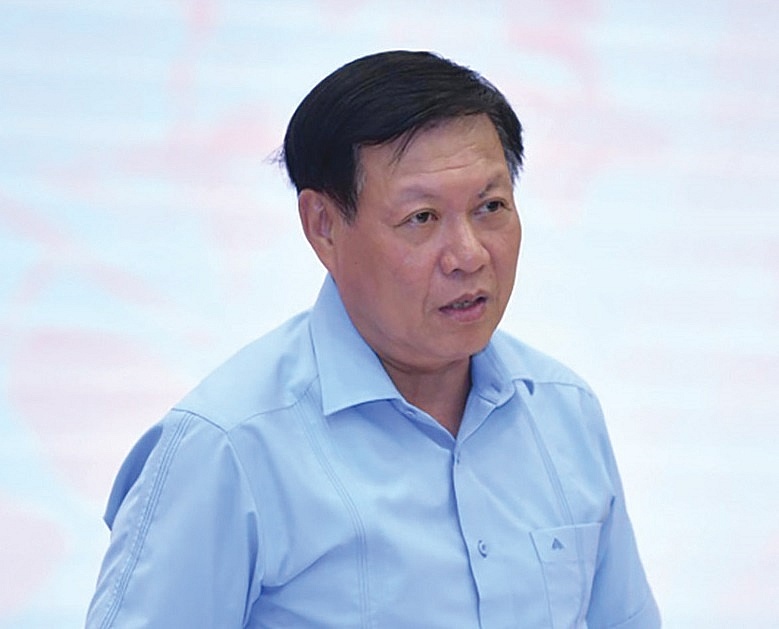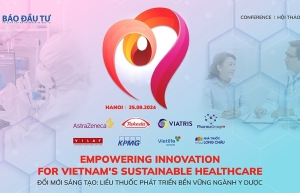Unlocking the potential of healthcare innovations
How is health innovation taking place happening in Vietnam and how does it benefit people?
Health innovation refers to the development and application of new ideas, technologies, processes, and solutions to improve quality and promote the application of scientific advances in the medical sector.
 |
| Do Xuan Tuyen, Deputy Minister of Health |
It will address the growing challenges and needs of healthcare, taking place in all stages from primary healthcare, disease prevention, and treatment to production of drugs, vaccines, and medical equipment.
The government has paid attention and directed the development and promulgation of many policies to promote application, technology transfer, and innovation activities. Based on the Party’s guidelines and policies, the trend of healthcare innovation has been taking place strongly in Vietnam with the involvement of many businesses, universities, research institutes, and hospitals. In addition, many forums promoting healthcare innovation have been organised by the Ministry of Health and other units in recent times.
In the context of the increasing demand for healthcare in Vietnam, health innovation has been playing an important role in improving the quality of healthcare, enhancing the ability to diagnose and treat, and promoting progress in medical research.
The application of advanced technologies such as AI, data analysis, VR, blockchain, and machine learning has also been widely applied in healthcare to help save time and costs, improve quality of life and human health. Moreover, accessing and promoting health innovation and developments is an important factor in the process of restructuring and improving the health system of Vietnam.
On the basis of inheriting and developing traditional medicine remedies and folk remedies combined with modern research results on chemical composition, pharmacological-clinical effects, modernising dosage forms has produced many types of traditional medicines and medicinal herbs to bring them to the market.
We are currently focusing on researching modern preparation technologies such as micro and nanotechnology, modified release preparation tech, targeted release preparation, and some advanced technologies to increase stability and therapeutic effects, gradually replace imported drugs, and increase healthcare access.
What are the advantages and challenges for the Vietnamese health sector in promoting innovation?
There are some advantages. A series of important policies supporting innovation activities have been issued, creating a strong driving force for the development of businesses and units in Vietnam, including businesses and units in the medical sector.
The innovation ecosystem is developing rapidly: Vietnam has made significant progress in improving innovation indicators, quickly catching up with countries in the region. The rate of users of technology products is also increasing rapidly and the startup movement associated with innovation is happening strongly.
However, there are still many challenges. Although our country’s innovation ecosystem has achieved positive initial results, it has not really had a big impact on units, especially those with limited resources.
Vietnam has many legal documents supporting innovation but they are not obvious, so it is difficult to implement. Regarding human resources, education and training at universities is still heavy on theory, and lacking practical experience for students.
Many agencies and ministries have introduced support policies. However, in reality, many units still struggle to know where to find support and investment capital. The lack of information about policies and forms of state support for innovation is a barrier that prevents units from taking advantage of opportunities or promoting improvements to accelerate innovation.
In addition, businesses, especially the startup community, still have difficulty accessing capital from venture capital funds.
Public innovation centres encounter bottlenecks in terms of the autonomy model of public service organisations, requirements related to investment management, asset management, sharing and use of public assets, and legal corridors for operation. Private innovation centres face challenges in developing revenue, profits, customers, and others.
What lessons about successful cases should Vietnam learn from in promoting innovation in the healthcare sector?
We can mention the United Kingdom’s successful experience and lessons in health innovation: health innovation organisations are established there with the main purpose of strengthening cooperation between medical experts, scientists, and technology businesses to create new products and services to improve people’s healthcare.
Healthcare startups are increasingly receiving attention and support from the government and various funding organisations such as DigitalHealth, London Accelerator, HealthTech Connect, and Innovate UK.
Innovation activities in the healthcare sector in the UK have achieved many successes in providing solutions, new medical products, and improving healthcare processes. Organisations such as the Accelerated Access Collaborative, NHS Innovation Accelerator, HealthTech Alliance, MedCity, and more focus on innovation in the sector, strengthening collaboration among investors, healthcare professionals and technology companies to develop new products, improve healthcare process, and enhance patient experience.
 | Empowering innovation for Vietnam's sustainable healthcare VIR plans to host a healthcare conference on September 25, expecting to attract about 200 participants, including policymakers, international organisations, senior experts, and those from the business community. |
 | Takeda’s decade of healthcare commitments in Vietnam For over 10 years, Takeda has been a dedicated healthcare partner in Vietnam, delivering transformative treatments and contributing significant value to public health. The recent approval of its dengue vaccine further strengthens this commitment. Dion Warren, Takeda’s area head for India and Southeast Asia, talked to VIR’s Bich Thuy about the company’s journey and its plans to bring more innovative medicines to Vietnam. |
 | GSK: from treatment to prevention for healthy ageing Dr. Pham Thi My Lien, president of GSK Vietnam, spoke with VIR’s Bich Thuy about the importance of adult vaccinations, one of the most effective interventions contributing to improved quality of life, reducing the burden on healthcare, the economy, and society. |
What the stars mean:
★ Poor ★ ★ Promising ★★★ Good ★★★★ Very good ★★★★★ Exceptional
Related Contents
Latest News
More News
- Masan Consumer names new deputy CEO to drive foods and beverages growth (February 23, 2026 | 20:52)
- Myriad risks ahead, but ones Vietnam can confront (February 20, 2026 | 15:02)
- Vietnam making the leap into AI and semiconductors (February 20, 2026 | 09:37)
- Funding must be activated for semiconductor success (February 20, 2026 | 09:20)
- Resilience as new benchmark for smarter infrastructure (February 19, 2026 | 20:35)
- A golden time to shine within ASEAN (February 19, 2026 | 20:22)
- Vietnam’s pivotal year for advancing sustainability (February 19, 2026 | 08:44)
- Strengthening the core role of industry and trade (February 19, 2026 | 08:35)
- Future orientations for healthcare improvements (February 19, 2026 | 08:29)
- Infrastructure orientations suitable for a new chapter (February 19, 2026 | 08:15)

 Tag:
Tag:


















 Mobile Version
Mobile Version